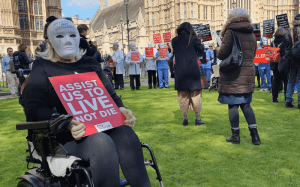The coronavirus pandemic is “supercharging” the inequalities already faced by disabled people, according to new research by a user-led organisation.
Glasgow Disability Alliance (GDA) has heard from thousands of disabled people over the last month through a survey designed to discover how they have been affected by COVID-19.
GDA said its research showed that two-fifths of disabled people in the city are concerned about food, medication or money; many disabled people have been left short of food after demand caused by the crisis has overwhelmed foodbanks and supermarket deliveries; and more than seven in 10 are worrying about becoming “acutely isolated”.
The also heard that vital information about the pandemic was not reaching disabled people in accessible formats.
Three-quarters (76 per cent) of those who took part in the research said they were not aware of any of the significant support offered by the voluntary sector in response to the crisis, or were unable to access it.
And more than 90 per cent of those who responded said they wanted disabled people’s voices to be heard in decisions about their lives and the response to COVID-19.
GDA concluded that COVID-19 had “supercharged inequalities already faced by Glasgow’s 150,000 disabled people”.
Last month, Glasgow City Health and Social Care Partnership said it was temporarily withdrawing support in their own homes from 1,600 disabled and older people, because of staffing problems caused by COVID-19, and that it was now concentrating on those with critical care needs.
Some service-users were given no notice at all that they were losing their support, while many disabled people have had to rely on neighbours or relatives, or have been left with no-one to meet their personal care needs.
GDA said: “Disabled members of GDA warn this is unacceptable, and far from sustainable, yet many fear their care may never be reinstated.”
Meanwhile, a BBC Disclosure investigation reported this week that thousands of people across Scotland had lost their care and support between January and April this year.
Nearly three-quarters of disabled people told by the government to shield at home during the pandemic crisis have not been able to secure a supermarket home delivery slot when they needed one, new user-led research suggests.
Disabled people in this group have been told they are at high risk from coronavirus, and so are supposed to be given priority for home deliveries.
But of those who responded to a questionnaire devised by the disabled people’s organisation Buckinghamshire Disability Service (BuDS), 74 per cent said they had faced problems.
Ann Hedges, who ran the poll for BuDS, said: “Although this is a relatively small poll, a huge majority of shielded people couldn’t get a home delivery slot.
“This clearly shows that the system is not working as it needs to.
“People with serious health conditions need confidence in the system to keep them safe at home, and that confidence is sadly lacking.”
Andrew Clark, chair of BuDS, said: “There is too much confusion about how the system works, too many conflicting actions and reports, and ultimately people aren’t getting delivery slots or food parcels and are having to rely on local volunteers to keep themselves fed.
“Voluntary support is fantastic, but it can’t last forever.
“If the government is expecting disabled and ill people to isolate themselves for months until a coronavirus vaccine is available, much better and more transparent support arrangements are needed.”
Nearly half of disabled adults (45 per cent) say they are very worried about the impact of COVID-19 on their lives, compared with 30 per cent of non-disabled adults, according to new figures released by the Office for National Statistics (ONS).
The ONS research also shows that nearly two-thirds (65 per cent) of disabled adults said concerns related to COVID-19 were affecting their wellbeing.
But it also shows that disabled adults are slightly more likely to support their local communities, with 65 per cent checking at least once on neighbours who might need help in the past seven days, compared with 63 per cent of non-disabled adults.
*Links to sources of information and support during the coronavirus pandemic include the following:
The Department of Health and Social Care
National Survivor User Network
A note from the editor:
Please consider making a voluntary financial contribution to support the work of DNS and allow it to continue producing independent, carefully-researched news stories that focus on the lives and rights of disabled people and their user-led organisations.
Please do not contribute if you cannot afford to do so, and please note that DNS is not a charity. It is run and owned by disabled journalist John Pring and has been from its launch in April 2009.
Thank you for anything you can do to support the work of DNS…

 Combined impact of different aspects of pandemic on disabled people ‘felt relentless’, Covid inquiry hears
Combined impact of different aspects of pandemic on disabled people ‘felt relentless’, Covid inquiry hears New government figures show key policy at heart of disability employment strategy ‘will not work’
New government figures show key policy at heart of disability employment strategy ‘will not work’ Title of assisted suicide bill is ‘misleading’ and ‘argumentative’, say disabled campaigners
Title of assisted suicide bill is ‘misleading’ and ‘argumentative’, say disabled campaigners